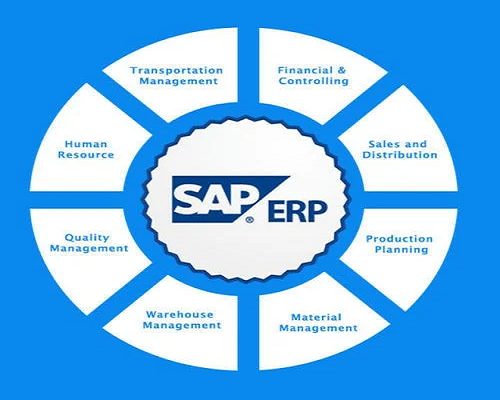SAP FICO Integration with Other SAP Modules: Maximizing Your ERP System
What is SAP FICO?
SAP FICO is the Financial Accounting and Controlling module in SAP ERP system. It is one of the most popular modules in SAP and deals with managing financial transactions and accounting information within the ERP system. The module is widely used by organizations to manage their financial accounting and reporting needs. It includes a number of sub-modules like General Ledger Accounting, Accounts Payable, Accounts Receivable, Treasury, and Taxation.
The SAP FICO module is integrated with other SAP modules like HR, procurement, sales, and marketing. This allows the users to manage all their financial transactions in a single platform. Additionally, the module provides analytical reports that can help businesses improve their overall decision making process.
What is ERP System?
Enterprise resource planning (ERP) allows an organization to utilize an arrangement of incorporated applications to deal with the business and manage the business connected with innovation, administrations and HR. ERP frameworks track business assets (cash, natural substances, creation limit) and the situation with business responsibilities: orders, buy requests and finance. The system's applications share data with departments like manufacturing, purchasing, sales, and accounting. Managers are able to plan more effectively and make better decisions as a result of this sharing of data. ERP systems can also be used to automate the management of information systems like email servers and computer databases within the business organizations.
SAP FICO Integration
SAP FICO integration is the process of integrating the FI (Financial Accounting) and CO (Controlling) modules of SAP ERP. This integration is important in order to ensure the consistency and accuracy of financial data across the entire system. The FI and CO modules are tightly integrated, and this integration is necessary in order to ensure that the financial data in the system is accurate and up-to-date. Without this integration, the data in the FI and CO modules would be out of sync, and this could lead to inaccurate financial reports.
SAP FICO integration with other SAP modules can help your business to get the most out of your ERP system and improve overall efficiency. By integrating FICO with other modules, you can automate financial processes, reduce data entry errors, and improve data visibility across your organization. In addition, SAP FICO integration can help you to streamline reporting and decision-making. Here are some of the key benefits of integrating SAP FICO with other modules:
1. Automate financial processes
By integrating FICO with other modules, you can automate financial processes. This can help to reduce data entry errors and improve data visibility across your organization. In addition, it can help to streamline reporting and decision-making.
2. Reduce data entry errors
By automating financial processes, you can reduce the number of data entry errors. This will help to improve overall efficiency and accuracy in your business operations.
3. Improve data visibility across your organization
Integrating FICO with other modules can help to improve data visibility across your organization. This can help to ensure that all relevant data is accessible and easily processed.
4. Streamline reporting and decision-making
By integrating FICO with other modules, you can streamline reporting and decision-making. This can help to ensure that all relevant information is available at a glance.
The integration of SAP FICO with other modules helps in increasing the efficiency of the overall process and also helps in reducing the complexity. The integration of SAP FICO with other modules also helps in reducing the data entry errors and also helps in maintaining the data consistency.
Maximizing ERP System using SAP FICO
Some tips on how you can maximize your ERP system using SAP FICO include:
- 1. Make sure to utilize all of the features and functionality that SAP FICO has to offer. This includes taking advantage of its financial accounting, controlling, and treasury capabilities.
- 2. Use SAP FICO in conjunction with other SAP modules to get the most out of your organization's data and information. This can include using SAP FICO to manage customer relationships, optimize operations, and track financial performance.
- 3. Make sure to keep up with the latest updates available for SAP FICO so that it remains up-to-date and compliant with industry standards. This will ensure that your system is able to handle future challenges and demands as they arise.
- 4. Work closely with your IT team to make sure that all of the necessary hardware and software is installed and configured properly in order to leverage the full potential of SAP FICO.
- 5. Train your employees on how to use SAP FICO and its various features so that they are able to efficiently manage your organization's finances and operations. This will help to ensure that your ERP system is utilized to its fullest potential.
- 6. Stay up-to-date on industry trends and changes so that you can make informed decisions when it comes to how best to utilize SAP FICO . This will help to ensure that your system is able to keep up with the latest innovations and best practices.
- 7. Regularly audit your system to make sure that it is performing as expected and that all of its various features are working as intended. This will help to ensure optimal performance and compliance with industry standards.
Challenges with SAP FICO
One of the challenges when integrating SAP FICO with ERP Systems is that the data may not be compatible. For example, the data format may be different or the data may be in different units. Another challenge is that the integration may require custom coding to map the data from the ERP System to the SAP FICO System. This can be time-consuming and expensive. Finally, it is important to test the integration thoroughly to ensure that it is working as expected. Otherwise, there could be unexpected consequences, such as incorrect credit decisions. Overall, integrating SAP FICO with an ERP System is a complex and challenging process, but it can be successful if done correctly.
- Different data formats: The data format for SAP FICO may be different from the data format for the ERP System. This can create challenges when trying to map the data between the systems.
- Custom coding: Sometimes it will require custom coding to integrate the two systems. This can be time- consuming and expensive.
- Tests: It is important to test the integration thoroughly to ensure that it is working as expected. Otherwise, there could be unexpected consequences, such as incorrect credit decisions.
- Successful integration: If done correctly, integrating SAP FICO with an ERP System can be successful. However, it is a complex and challenging process.
There are a few things that you can do to help make the integration process easier:
- Make sure that the data formats are compatible: Make sure that the data formats are compatible before starting the integration process. This will minimize the number of challenges that you will encounter later on in the integration process.
- Use custom code to map the data: If necessary, use custom code to map the data between the systems. This can make the integration process easier and faster.
- Test thoroughly: Test the integration thoroughly to ensure that it is working as expected. Otherwise, there could be unexpected consequences, such as incorrect credit decisions.
- Be prepared for challenges: Be prepared for any challenges that you may encounter during the integration process. This will help ensure that the integration is successful.
Benefits of integrating SAP FICO in ERP systems
Some of the key benefits of integrating SAP FICO with ERP systems include:
- Improved Financial Visibility and Control: Integration of SAP FICO with an ERP system can provide businesses with improved financial visibility and control. This is because the system can help you track and manage all your financial data in one place. This can help you better understand your finances and make informed decisions.
- Streamline Financial Processes: Integration of SAP FICO with an ERP system can also help streamline financial processes. For example, it can help you automate various financial tasks, such as reconciling accounts receivable and payable data. This can save you time and money, and improve your business’s overall efficiency.
- It can help improve financial visibility and control, and can also help streamline financial processes. Additionally, it can help businesses better manage their cash flow and reduce accounting and administrative costs. Overall, integrating SAP FICO with ERP systems can provide significant benefits for businesses of all sizes.
Conclusion
ERP systems are often used by businesses to manage their operations, and integrating SAP FICO with an ERP system can help businesses manage their finances more effectively. By integrating SAP FICO with an ERP system, businesses can take advantage of the benefits of both systems, such as the ability to track financial data in real-time and the ability to automate financial processes. Additionally, businesses can avoid the need to maintain multiple software systems, which can be time-consuming and difficult to manage. This can be expensive too! By integrating SAP FICO with an ERP system, businesses can ensure that their finances are managed effectively and efficiently.
Find a course provider to learn SAP FICO
Java training | J2EE training | J2EE Jboss training | Apache JMeter trainingTake the next step towards your professional goals in SAP FICO
Don't hesitate to talk with our course advisor right now
Receive a call
Contact NowMake a call
+1-732-338-7323Take our FREE Skill Assessment Test to discover your strengths and earn a certificate upon completion.
Enroll for the next batch
WFH Financial Opportunity
- Feb 23 2026
- Online
SAP FICO
- Feb 24 2026
- Online
WFH Financial Opportunity
- Feb 25 2026
- Online
SAP FICO
- Feb 26 2026
- Online
WFH Financial Opportunity
- Feb 27 2026
- Online
Related blogs on SAP FICO to learn more

SAP FICO in 2025: Salary, Jobs & How to Get Certified
AP FICO professionals earn $90,000–$130,000/year in the USA and Canada—and demand is skyrocketing! If you’re eyeing a future-proof IT career, SAP FICO (Financial Accounting & Controlling) is your golden ticket. But where do you start? Sulekha IT Serv

What is the functional area in SAP FICO?
In SAP FICO (Financial Accounting and Controlling), the term 'functional area' refers to a key organizational element allowing a more detailed classification of financial transactions and reporting. The functional area is a component of SAP's organiz

Exploring the Different Career Paths in SAP FICO: Which One is Right for You
As of this month's recent data, SAP FICO professionals in the job market have increased to 16, 40,000, and it is expected to grow based on the location and organization needs. This is a unique career path for many professionals intending to begin the

Crucial sub-modules within SAP FICO platform!
SAP FICO is one of the several modules in SAP, a leading relational database management system with artificial intelligence. The term FICO in SAP FICO stands for Financial Accounting (FI) and Controlling (CO).

Fancy a career in SAP FICO? Here is what you ought to know
SAP is the acronym for ‘System Application and Products’. It was found in the year 1972 by 5 IBM employees in Germany with the aim of assisting businesses in managing their operational processes.

Expertise on FICO among the top SAP Skills
There would no two opinions on the significance of SAP ERP. Several modules are available in SAP ERP where some of them hold tremendous potential from the career standpoint. A career in these SAP modules will not only offer you a professional growth

How SAP FICO influences the growth of a business?
The reason for SAP FICO being the most preferred financial software than many other platforms such as Oracle, BAAN etc. is that its compatibility and configuration features. SAP FICO is compatible with many systems and it does have exclusive configur

Top SAP Skill Sets Required For the Coming Years
According to the statistics reported by one of the prominent research firms, SAP skills have been ranked as one of the top 7 skills in IT in demand during 2015. That certainly makes SAP FICO a lucrative subject to pursue. So, it is very important to

Redefine the efficiency in enterprise accounting with SAP FICO!
Be it preparing reports and statements or generating financial forecasts, business and financial accounting are completely complicated processes. It consumes enormous time and resources too. But gone all the hard days where preparing financial statem

How to Make It Big As A SAP FICO Consultant
SAP FICO is an important module of the ERP (Enterprise Resource Planning, which isbusiness management software for integrated applications) and both FI and CO modules store financial transactions data. The
Latest blogs on technology to explore

Drug Safety & Pharmacovigilance: Your 2026 Career Passport to a Booming Healthcare Industry!
Why This Course Is the Hottest Ticket for Science Grads & Healthcare Pros (No Lab Coat Required!)" The Exploding Demand for Drug Safety Experts "Did you know? The global pharmacovigilance market is set to hit $12.5B by 2026 (Grand View Research, 202

Launch Your Tech Career: Why Mastering AWS Foundation is Your Golden Ticket in 2026
There’s one skill that can open all those doors — Amazon Web Services (AWS) Foundation

Data Science in 2026: The Hottest Skill of the Decade (And How Sulekha IT Services Helps You Master It!)
Data Science: The Career that’s everywhere—and Nowhere Near Slowing Down "From Netflix recommendations to self-driving cars, data science is the secret sauce behind the tech you use every day. And here’s the kicker: The U.S. alone will have 11.5 mill

Salesforce Admin in 2026: The Career Goldmine You Didn’t Know You Needed (And How to Break In!)
The Salesforce Boom: Why Admins Are in Crazy Demand "Did you know? Salesforce is the 1 CRM platform worldwide, used by 150,000+ companies—including giants like Amazon, Coca-Cola, and Spotify (Salesforce, 2025). And here’s the kicker: Every single one

Python Power: Why 2026 Belongs to Coders Who Think in Python
If the past decade was about learning to code, the next one is about coding smarter. And in 2026, the smartest move for any IT enthusiast is learning Python — the language that powers AI models, automates the web, and drives data decisions across ind

The Tableau Revolution of 2025
"In a world drowning in data, companies aren’t just looking for analysts—they’re hunting for storytellers who can turn numbers into decisions. Enter Tableau, the #1 data visualization tool used by 86% of Fortune 500 companies (Tableau, 2024). Whether

From Student to AI Pro: What Does Prompt Engineering Entail and How Do You Start?
Explore the growing field of prompt engineering, a vital skill for AI enthusiasts. Learn how to craft optimized prompts for tools like ChatGPT and Gemini, and discover the career opportunities and skills needed to succeed in this fast-evolving indust

How Security Classification Guides Strengthen Data Protection in Modern Cybersecurity
A Security Classification Guide (SCG) defines data protection standards, ensuring sensitive information is handled securely across all levels. By outlining confidentiality, access controls, and declassification procedures, SCGs strengthen cybersecuri

Artificial Intelligence – A Growing Field of Study for Modern Learners
Artificial Intelligence is becoming a top study choice due to high job demand and future scope. This blog explains key subjects, career opportunities, and a simple AI study roadmap to help beginners start learning and build a strong career in the AI

Java in 2026: Why This ‘Old’ Language Is Still Your Golden Ticket to a Tech Career (And Where to Learn It!
Think Java is old news? Think again! 90% of Fortune 500 companies (yes, including Google, Amazon, and Netflix) run on Java (Oracle, 2025). From Android apps to banking systems, Java is the backbone of tech—and Sulekha IT Services is your fast track t
